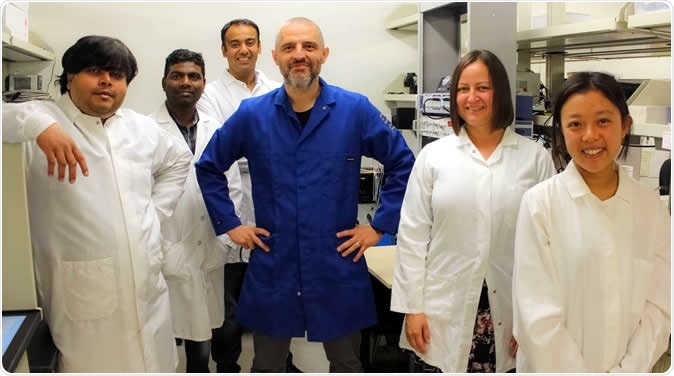Diabetes, which is marked by increased glucose levels in the body, eventually leads to certain complications, including cardiovascular disease. Now, a new study shows a cellular connection between diabetes and blood vessel narrowing that boosts one’s risk of chronic and potentially fatal health conditions, including stroke and heart disease.
The researchers hope that the findings of the study can help formulate new treatments for diabetes, beyond just controlling and monitoring blood sugar levels. The cellular level connection may help new treatments target the molecular source of high blood sugar’s damaging effects on the blood vessels.

The Navedo lab team is identifying how diabetes increases the risks of serious health conditions such as heart disease and stroke. From left to right are Debapriya Ghosh, Gopireddy Reddy, Arsalan Syed, Manuel Navedo, Madeline Nieves-Cintrón and Thanhmai Lee. Image Credit: UC Regents / UC Davis Health
Protein kinase A increases calcium channel activity and constriction of blood vessels
In the past, the team conducted a similar study, analyzing hyperglycemia or high blood glucose and how it triggers an enzyme known as protein kinase A (PKA), which in turn, boosts calcium channel action, resulting in blood vessel constriction.
"This was a surprise since PKA is typically associated with blood vessel widening and wasn't really on our radar. We wanted to understand the molecular processes that created this opposite reaction,” Manuel Navedo, Professor of Pharmacology at UC Davis Health, said.
But, the mechanism by which glucose activates PKA remains unclear, the researchers noted. In the study published in The Journal of Clinical Investigation, they showed that elevating extracellular glucose triggers cyclic adenosine monophosphate (cAMP), second messenger that’s vital for biological processes and cellular messenger with a critical role in vascular cell function, production in arterial myocytes, which was particularly dependent on adenylyl cyclase 5 (AC5) activity.
To land to their findings, the team performed experiences on the impact of elevated glucose on arterial cells and cerebral blood vessels, which control and maintain blood flow in the vessels. The researchers tested these on laboratory mice, two mouse models of diabetes and a genetically modified mouse.
Specifically, they focused on the connection between PKA and adenylyl cyclase (AC), an enzyme involved in cyclic AMP (cAMP) production. They found that AC5 facilitated cAMP and PKA activation, stimulating increase calcium channel activity and subsequent blood vessel vasoconstriction. Also, they discovered that AC5 was crucial for blood vessel vasoconstriction during diabetes.
Vascular complications in diabetes
Vascular complications during diabetes are the main risk factors for cardiovascular illnesses, such as hypertension, heart disease, and stroke. These complications are often associated with increased blood glucose levels or hyperglycemia.
The team anticipates doing further tests on the impact of the AC5 chain reaction in humans. The study may pave the way for new treatment approaches that target the reduction of vascular complications of diabetes.
There are many patients in clinics and hospitals battling diabetes and its complications, particularly those which are damaging to the vital organs of the body, including the heart, kidneys, and the brain. The study on vascular effects of elevated blood sugar levels in the cellular level could open the doors for new treatment modalities to combat diabetes and cardiovascular diseases.
What is diabetes?
Diabetes is a condition that happens when the blood glucose, also dubbed as blood sugar, is too high. Insulin, a hormone produced and released by the pancreas, aids in glucose absorption in the cells to be used for energy.
In diabetes, the pancreas doesn’t produce enough insulin or doesn’t produce insulin at all. As a result, glucose stays in the blood. Though glucose is the main source of energy in the body, if it won’t enter the cells and stays in the blood, it can cause detrimental effects to the different organs in the body.
In the long run, too much glucose or sugar in the blood can lead to complications, including kidney disease, cardiovascular disease, neuropathy, and vision loss, among others.
Worldwide, the number of people with diabetes increased from 108 million in 1980, to a staggering 422 million in 2014. The number has increased over the past years, especially in middle-and low-income countries.
In 2016 alone, about 1.6 million deaths were linked to diabetes, and another 2.2 million deaths were attributed to high blood glucose in 2012.
Journal reference:
Syed, A., Reddy, G., Ghosh, D., Prada, M. P., Nystoriak, M., Morotti, S., Grandi, E., Sirish, P., Chaimvimonvat, N., Hell, J., Santana, L., Xiang, Y., Nieves-Cintron, M., and Navedo, M. (2019). Adenylyl cyclase 5–generated cAMP controls cerebral vascular reactivity during diabetic hyperglycemia. The Journal of Clinical Investigation. https://www.jci.org/articles/view/124705